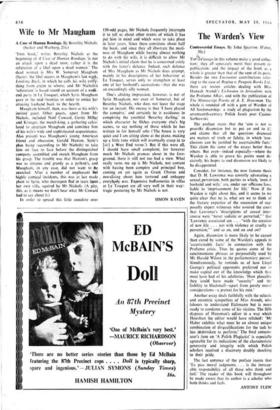Wife to Mr Maugham
`Tuts book,' writes Beverley Nichols at the beginning of A Case of Human Bondage, 'is not an attack upon a dead man; rather it is the refutation of a libel upon a dead woman.' The dead woman is Mrs W. Somerset Maugham (Syrie); the libel occurs in Maugham's last w Looking Back, in which he calls his wife ev thing from cretin to whore; and Mr Nichols!, `refutation' is based round an account of a weSt- end party in Le Touquet, which Syrie Maugham gave in the mid-'twenties in order to entice her straying husband back to the hearth.
Maugham himself, then, was there as his wife's invited guest. Other guests, apart from Mr Nichols. included Noel Coward, Gertie Millar and Kreuger, the match-king, a gathering calcu- lated to entertain Maugham and convince him of his wife's wide and sophisticated acquaintance. Also present was Maugham's young American friend and obsession, Gerald Haxton, Syrie's plan being (according to Mr Nichols) to take him on face to face before the distinguished company assembled and snatch Maugham from his grasp. The trouble was that Haxton's grasp was as sinuous and greedy as a python's, and Maugham, in any case, did not want to dsg snatched. After a number of unpleasant lint highly comical incidents, this was at last made plain to Syrie, who thereupon fled in tears fgpm".,4 her own villa, squired by Mr Nichols. (A pity, this, as it means we don't hear what Mr Coward had to say about it.)
In order to spread this little anecdote over
150-odd pages, Mr Nichols frequently interrupts it to tell us about other events of which it has put him in mind and which were to take place in later years. Since these constitute about half the book, and since they all illustrate the nasti- ness of Maugham while having almost nothing to do with his wife, it is difficult to allow Mr Nichols's initial claim that he is concerned solely with the latter's defence. Indeed, such defence of Mrs Maugham as Mr Nichols does attempt, mainly in his descriptions_of her behaviour at
'Touquet, serves only to strengthen at least one of her husband's accusations—that she was an exceedingly silly woman.
One's abiding impression, however, is not of Syrie Maugham, nor even of Somerset, but of Beverley Nichols, who does not leave the stage for an instant. His excuse is that 'I have played the compere,' and certainly he is assiduous in compering the youthful 'Beverley darling,' in which character he filches everyone else's big scenes, to say nothing of those which he has written in for himself solo (`The house is very quiet and I am sitting alone at the piano, making up a little tune which will eventually creep in to [sic] a West End revue.'). But if this were all, I should have small complaint, for however much Mr Nichols prances about in the fore- ground, there is still not too bad a view. What really turns me up is Mr Nichols, not content with having been compere and principal boy, coming on yet again as Greek Chorus and moralising about how tortured and unhappy everybildy: was. Expensive buffooneries in villas at Le Touquet are all very well in their way: tragic posturing by Mr Nichols is not.
SIMON RAVEN


































 Previous page
Previous page